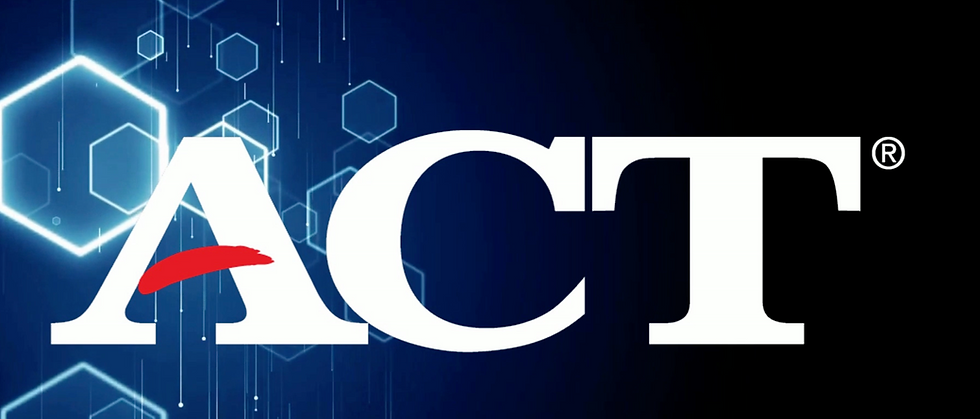Prepare now for the new test and its options!

The new ACT will be introduced to test takers in April 2025. For applicants to one of the U.S. service academies or ROTC scholarships, this updated test format impacts you immediately.
Similar to the recent digital update for the SAT -- introducing a new format in March 2024 -- the ACT is also experiencing changes. The updates include a shorter format, an optional Science section, and an option for students to select between paper and digital versions.
The changes will be implemented with national online testing starting April 2025, followed by the school day testing rollout (typically sponsored by your school) a year later in spring 2026.

For applicants to any of the service academies, such as the AF Academy, Naval Academy and Military Academy, the ACT is one of two tests that all applicants must take. The schools are open to either test, the ACT or the SAT. For many students, it makes sense to take both to determine which test is 'better' for each of them. I have students every year who perform significantly better on one test over the other. The service academies have no preference so choose the best alternative that works for you!
So, let's discuss some of the coming changes and the key decisions that you must make if you decide to take the ACT.
The changes are:
Shorter test times
Voluntary Science section
An option to take the test digitally or on paper
Current subjects remain the same:
English
Reading
Math
Optional Science
Optional Writing
All sections are shorter than the previous versions of the ACT
Here's more information about some of the most important ACT changes:
Shorter Test Times
The length of the test was reduced to about two hours, with Science and Writing each adding an additional 40 minutes. Additionally, there will be 44 fewer questions, and the number of answer choices per question in the Math section was reduced from five to four.
Voluntary Science Section
Like the Writing section, the Science section will also become optional. Therefore, a student's overall ACT score – known as the composite score – will be an average of the English, Math and Reading sections. Although the composite score will no longer include the Science section, the score scale will remain the same scale of 1 to 36.
As an applicant for any military scholarship, you should take the Science section. If you score well early in the cycle on this section, then with superscoring, you may want to drop it when you take another test (or two) later in the year.
For example, on the April test, let's imagine you score a 28 on each of the standard sections (Math, Reading and English) and a 35 on the Science section. The strong Science score will allow you to skip the optional Science section in July and simply take the new core ACT sections (Math, Reading and English) to earn better individual scores. WIth superscoring, you will benefit from the best components that you have earned to form the best ACT combination, i.e, a 'superscore'!
One 'superscoring' exception is Air Force ROTC and NROTC (Marine option). For the AFROTC scholarship application, they only accept the best set of scores all taken with the same test. Thus, I recommend taking all fours sections each time. The Marine option scholarship takes your most recent set of scores.
Digital or Paper Format?
The ACT offers both paper and digital formats, allowing students to choose their preferred option. Both will use the same timing and question/problem types so the preference comes down to which format a student feels more comfortable. However, note that national center test-takers will take the new online version of the ACT beginning in April 2025, while the updated paper format will be offered five months later with the September test date.
Students who choose to take the paper-based ACT on the April, June, and July 2025 test dates will use the older format tests, while digital test takers will encounter the new format. For international students, the new digital format will be available in September 2025. All students in the U.S. and abroad will use digital devices provided at the test site.
It's important to mention that while the redesigned test will be available in a digital format, it will not be adaptive like the SAT. The digital version will be the same as the paper version, just presented on a different platform. With the SAT 'adaptive test,' a student's performance on the initial sections dictate the difficulty level of the second sections.
Preparing
There are many options to help prepare for the test, including self-guided online resources, national test-prep companies and private tutors. ACT and Kaplan, for example, offer free practice exams, videos and testing strategies on their websites. There are also paid study options.
Since the redesigned ACT will include all of the same topics and question types as the current version, students can continue to use existing resources to prepare. Practice tests and preparation materials for the new version of the ACT will be released in early 2025.
The new ACT will arrive soon. Makes plans now to understand which version you will encounter as you choose testing sites and dates for yourself. In all cases, preparing early is an key strategy for success on the ACT -- no matter if it is the new or old version. Good luck with your testing!
[I would welcome a chance to discuss details with you. I offer coaching services to pace and prepare you (and your parents!) for the entire Academy application process . . . including advising you around preparations for the ACT or SAT. Contact me at chris@cbbrechin.com, 503.515.7406 or use my contact form on this website.]


コメント